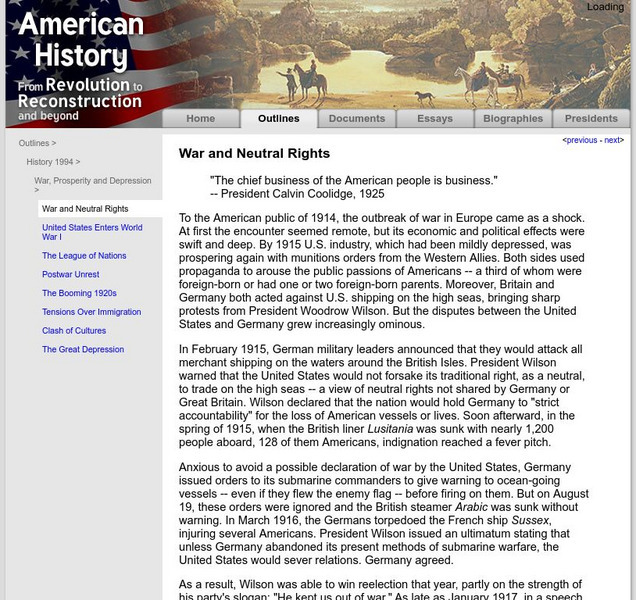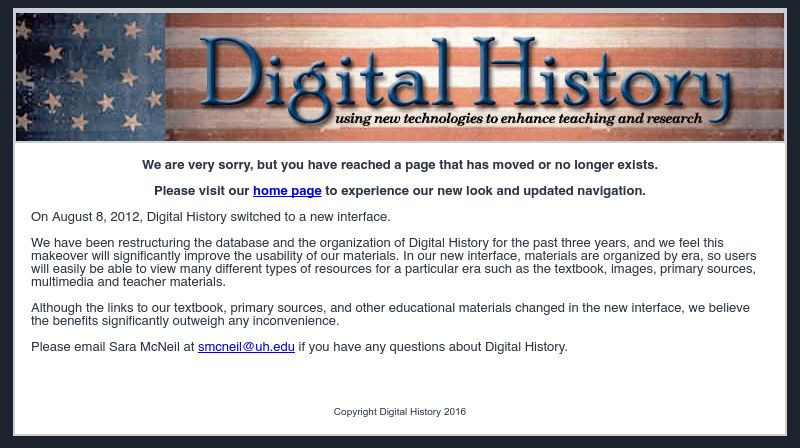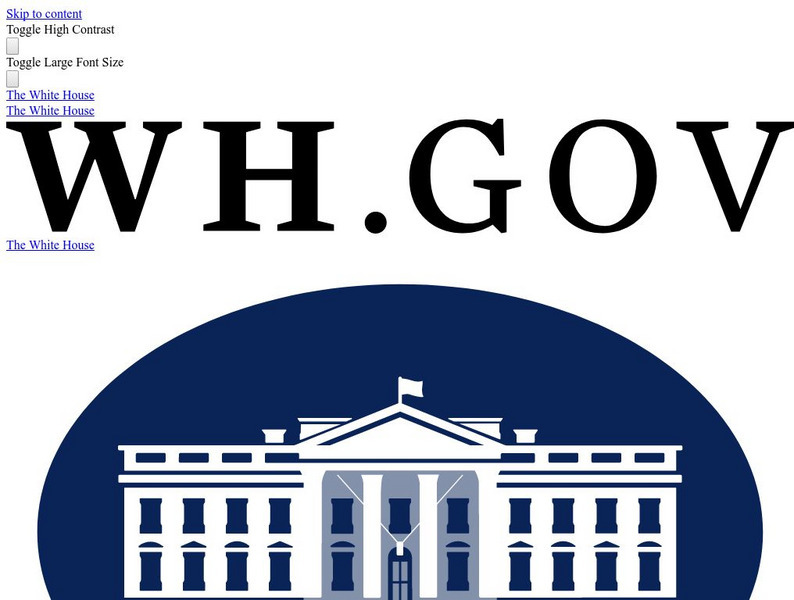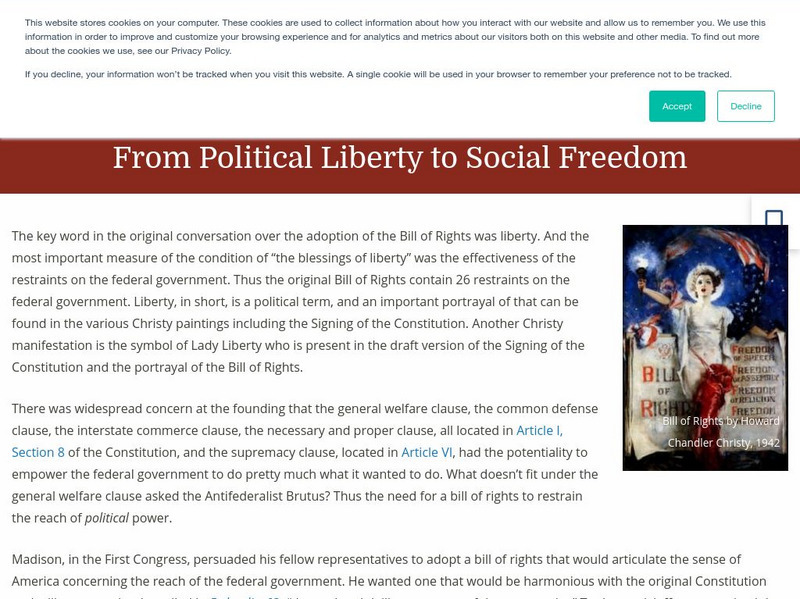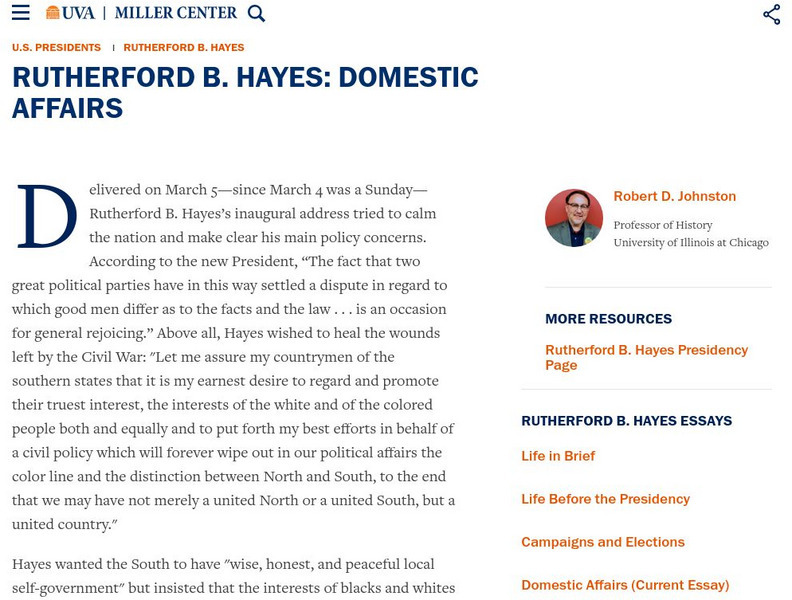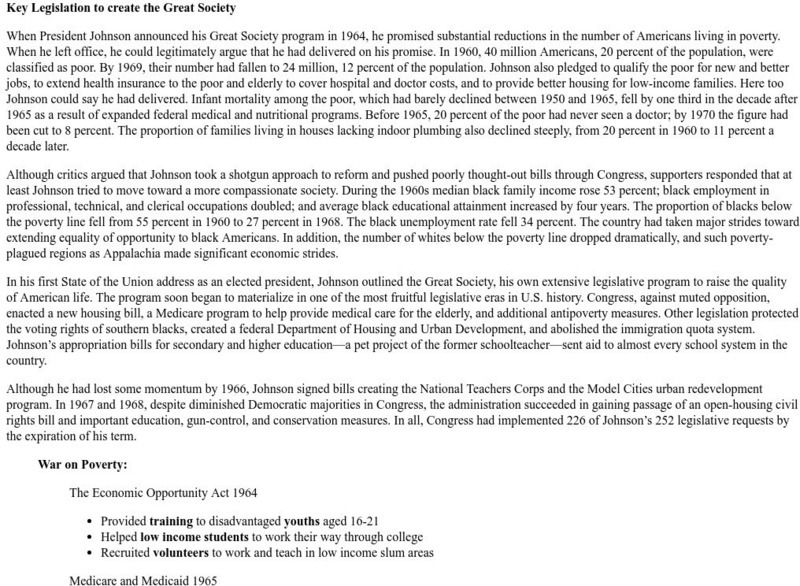Council for Economic Education
Econ Ed Link: New Sense, Inc. Vs. Fish 'Till U Drop or Coase vs. Pigou
Hot debate and arguments galore whirl around this question: "Which economic approach is the most efficient and fair to resolve utility issues surrounding the use of common or public property?" This lesson will explore, examine and...
University of Groningen
American History: Outlines: War and Neutral Rights
This resource presents a brief discussion of U.S. neutrality early in World War I and of the events which brought the country closer to war.
PBS
Wnet: Thirteen: The Rise and Fall of Jim Crow: The Atlanta Compromise Speech (1895)
Find out how Booker T. Washington tried to allay the fears of white Southerners in his speech in Atlanta in September, 1895. Although hailed as a new era in which blacks would give up their civil and political rights and in return get...
Other
Global Environmental and Outdoor Education Council: World of 100 (Simulation)
This simulation activity teaches students about the inequities in access to global resources, and our responsibility as global citizens to protect the rights and welfare of people around the world who may be impacted by our economic...
OpenStax
Open Stax: Contesting Futures: America in 1960s: Lyndon Johnson and Great Society
Read about the reforms and legislation undertaken through Lyndon B. Johnson's concept of the Great Society. These included economic and educational reforms, consumer protection, changes to immigration laws, and the Voting Rights Act of...
Annenberg Foundation
Annenberg Learner: America's History in the Making: Egalitarian America
Comprehensive teaching unit on egalitarian America: Americans that demanded political, social, and economic equality in all walks of life. Learn how the civil rights movement and an expanding mass media helped to reshape a changing...
Digital History
Digital History: The Great Society and the Drive for Black Equality
Read about President Lyndon Johnson's vision for the Great Society. See how the programs instituted were focused on lifting the poor from poverty, especially African Americans. Included were laws to increase civil rights and voting...
National Women’s History Museum
National Women's History Museum: Inventive Women Part 2
Students will examine The Declaration of Sentiments from the perspective of its call for women's economic equality.
Curated OER
National Park Service: The Chicano Movement
Site provides information on the major concepts that fueled the Chicano Movement: focus on politics, economic change, education reform, challenging the Catholic Church, cultural renaissance, and Chicano expression.
The White House
The White House: Issues
Official page from the White House provides information on the Presidential agenda regarding major topics such as Immigration, Civil Rights, Defense, Economy, Education, Health Care, Taxes, and more.
Teaching American History
Teaching American History: From Political Liberty to Social Freedom
In the early stages of the new nation's government the members of Congress sought to protect the citizens from political tyranny. Social freedoms emerged in the twentieth century when FDR begged for economic protection of U.S. citizens.
Emory University
Globalization Website: Globalization Glossary
This website is a glossary of words and phrases used in explaining the globalization of economies, politics, human rights, and world culture.
PBS
Pbs News Hour: The Market Shaker
PBS NewsHour's Jim Lehrer discusses the power of Federal Reserve Chairman Alan Greenspan and his influence upon the world market with other financial experts. Includes links on the right to other Greenspan-related NewsHours.
British Library
British Library: Dickens's Hard Times: Industrialisation
In this activity, students will examine the working lives of those who produced goods in factories, towns, and cities and investigate the social and economic backdrop to Charles Dickens's novel "Hard Times".
PBS
Pbs Learning Media: Bayard Rustin: A Freedom Budget, Part 2
This audio excerpt from Bayard Rustin's 1967 "Freedom Budget" speech outlines a nine-year plan to end poverty in America.
Forum Romanum
Outlines of Roman History: Grievances of the Plebs
William Morey explains the tension between the Roman aristocracy, the patricians, and the plebeians with the establishment of the Republic. The First Secession of the plebeians brings some relief.
University of Virginia
Miller Center at Uva: u.s. Presidents: Rutherford Birchard Hayes: Domestic Affairs
An in-depth analysis of the domestic policies and problems that Rutherford B. Hayes faced as president. Read about the end of Reconstruction, Hayes' economic policy, his troubles with a Democratic majority in the Congress, and his...
Countries and Their Cultures
Countries and Their Cultures: Peripatetics of Iraq, Syria, Lebanon, Jordan, Israel, Egypt, Sudan, and Yemen
Most of these groups are now sedentary or semi-sedentary, and only a few are still nomadic. There is no overall system of political organization within any of these communities, but cohesion within each community is strong. In Egypt,...
Other
Weber State: Key Legislation to Create the Great Society
Read about President Lyndon Johnson's vision for a more compassionate America, one that offered educational and housing opportunities, protected the envrionment, and cared for the nation's seniors. Find a list of the legislation passed...
Other
Pbs: Half the Sky: Turning Oppression Into Opportunity for Women Worldwide
A program to put an end to the oppression of women and girls worldwide brings together an information site where visitors can find blogs, social media feeds, celebrity and crew diaries, videos, and up-to-date information about the...
iCivics
I Civics: Government & the Economy
Students learn how government and the economy are related and the difference between market, command, and mixed economies.
Council for Economic Education
Econ Ed Link: Be All You Can Be for Minimum Wage? (Educator Page)
This lesson plan ask students to calculate the percentage change in military strength over the last two decades, hypothesize economic (and non-economic) explanations for these changes, test hypothetical explanations by reading an...
Council for Economic Education
Econ Ed Link: Be All You Can Be for Minimum Wage? (Student Page)
This lesson ask students to calculate the percentage change in military strength over the last two decades, hypothesize economic (and non-economic) explanations for these changes, test hypothetical explanations by reading an economic...
Council for Economic Education
Econ Ed Link: Martin Luther King Jr. Day
This lesson provides links for students to use as they explore history behind the Dr. Martin Luther King, Jr. Day observance and the Civil Rights Movement. A strong focus is given to the economic barriers faced by African Americans.

